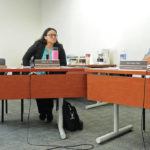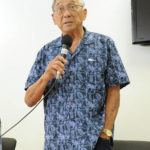KAILUA-KONA — After a full morning of public testimony and discussion that went into Thursday afternoon, the Leeward Planning Commission voted to forward to the County Council a favorable recommendation on a vacation rental bill, along with some suggestions for changes from the Planning Department and the commission itself.
The bill, sponsored by Kona Councilman Dru Kanuha and North Kona Councilwoman Karen Eoff, aims to better regulate short-term vacation rentals, defined specifically as rentals with five or fewer bedrooms and where the owner or operator doesn’t live on site.
It’s a bid at stopping unhosted short-term rentals in the county’s agricultural and residential zones.
Owners of existing rentals in prohibited areas would be grandfathered in by applying for a nonconforming use certificate, which must be renewed on a yearly basis. The bill already went through the Windward Planning Commission and now returns to the County Council Planning Committee for another hearing and potential amendments. It then will be considered by the council for two more readings.
County Planning Director Michael Yee included a favorable recommendation for the bill in his report, but he outlined more than a dozen recommended changes, touching on matters of housekeeping to more substantive changes such as increased fines for scofflaws.
The Leeward Planning Commission throughout Thursday morning heard from residents on all sides of the issue.
Some, such as Larry and Margaret Jose, came frustrated with the impact nearby vacation rentals have had on their lives.
“For these past three nights, I’ve been kept up three nights in a row,” said Margaret Jose, sharing about a vacation rental in Holualoa. “People drinking, yelling, screaming making noise.”
Others, however, spoke out against more regulation on the way people use their property.
“It’ll do harm to the people of Hawaii,” said Greg Gerard of Captain Cook. “You know, we’ve got elder people who are helping with housekeeping, with repairs, things like that. You have no idea the kind of economic consequence you’re bringing if you impose this harsh, un-thought-out bill with huge consequences.”
But from almost the start of the meeting, one looming concern was the impact the bill could have on local condo-hotels situated in a residential multifamily zone just outside the General Plan’s resort code, meaning they’d be cut out of the permitted areas for short-term vacation rentals.
During their presentation on the director’s recommendation, department staff said they are looking at ongoing revisions to the General Plan that could identify areas that could be “more suitable for resort designation,” so they could be a permissible area for short-term vacation rentals.
Commission Chairman Keith Unger questioned why the issue isn’t being addressed in the legislation at hand, saying 95 percent of the testimony commissioners already read concerns about this precise issue.
Residents, including Sharon Diedrichs who owns a condo at condo-hotel Kona by the Sea, also spoke out about the impacts the legislation could have. She noted her appreciation for the work that has gone into the issue, but said Kona by the Sea “is absolutely a hotel,” pointing out its front desk for guest check-ins and other amenities.
“This option to join the short-term vacation rental program pool has always been available to us since we purchased our units for those who live there when we decide we need to spend more time on the mainland or move there to care for family or seek medical attention,” Diedrichs said. “We want to be able to rent out our property, but this bill would take that right away from us just because our zoning doesn’t fit this bill.”
Diedrichs proposed the county consider a special designation for properties like condo-hotels so they are “aligned with their intent to serve the tourist community.”
When Unger returned to the point during the commission’s discussion, Yee said that given the bill’s intent of restricting vacation rentals in residential zones, “these condo-hotels got caught up because they were in the residential zone.”
Since the issue came to the department’s attention, he said, there had been much discussion on what to do about it, with options such as those concerning the General Plan as well as more procedural approaches such as considering condo-hotels as “hosted rentals,” which aren’t affected by the bill.
But, he said, the concern arose too late to come up with a fully vetted solution in time for the hearing.
Unger said he strongly supported addressing the issue in this bill rather than waiting for the General Plan, saying he thinks it’s unfair to the affected property owners and irresponsible to tell them it would be addressed in a review of the General Plan.
“I think we all understand that could be a five-, six-, 10-year process. That’s a huge process,” he said. “And in the meantime these property owners are non-conforming users.”
Yee added that bringing an unvetted recommendation to the commission for Thursday’s meeting “would have been dangerous on Planning’s standpoint,” and that there wasn’t enough time to do all the necessary vetting.
In its final vote on recommendations for the bill, commissioners included one recommendation for continued research into ways high-density residential properties could be permitted for use as short-term vacation rentals.
Email Cameron Miculka at cmiculka@westhawaiitoday.com.

